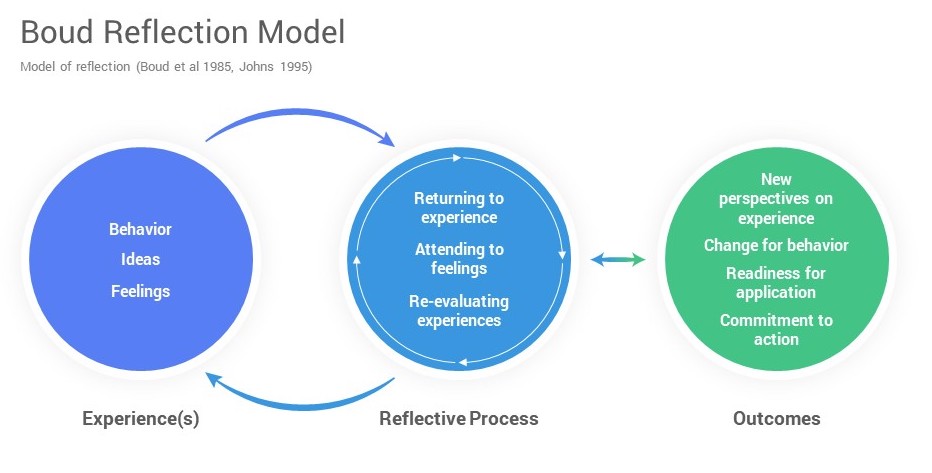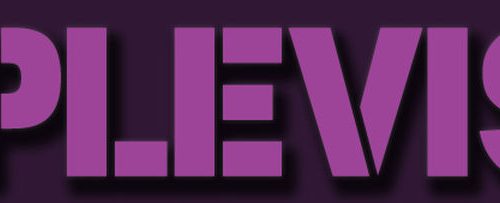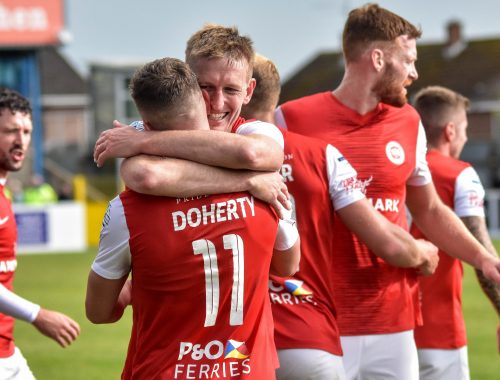Forging On Through Anxiety
By Mallory Holt
I am a worrier in all aspects of my life, and securing an internship was no different. In fact, as an international student looking to work in Northern Ireland, I’d say my placement was towards the top of my worry list. In what felt like a true miracle at work though, in the first week of term I found myself doing a Zoom interview with the staff at Score Draw Music, and a few weeks later began what has been an immensely rewarding placement so far.
In re-examining this experience, I found clarity in using the Boud et al. model of reflective practice. I appreciate its recursive, three-tiered approach of “the experience, . . . the reflective activity based upon that experience” (18), and any learning outcomes that were discovered as a result (19), as well as its willingness to value emotional responses (31).

Experience
My placement experience began as most of my experiences do: with worry. I had reached out to an array of post-production companies, only to receive one email back from Start Together Studios kindly informing me that the studio likely wouldn’t be the best fit. Instead, the owner suggested I inquire at Score Draw Music. At this point, resigning myself to never finding a proper placement and spiralling into thinking I wouldn’t be able to work in Northern Ireland ever, I sent my interest along and held my breath. When I heard back, I was overjoyed to find they accepted placement students. That joy immediately became panic when Mary Johnson asked for my CV and showreel. Having only the former and no inkling nor DAW to edit my past work into said showreel, my panic kicked into hyperdrive. I had less than 4 days to polish both, and riding high on the fear, I worked furiously, presenting both to Mary on time, scoring myself a placement with Score Draw only a few days later.
Reflection
Taking the time to appraise myself honestly on my experiences (Boud and Walker 205) I came to many points of reflection.
The panicky drive to finish my CV and showreel by the date I promised Mary pushed me to research editing software to put together my showreel that I likely would not have researched on my own. Having no scope for proper showreel parameters, I needed to ask for insight from those in the field with no fear that I might sound ignorant for not knowing in the first place. And, when my anxiety became an obstacle instead of an aid, I was reminded by my family to use it as a challenge to overcome and triumph over. Not every emotion is positive, but instead of simply removing the negative ones, I used them as a springboard to achieve further heights.
Score Draw has given me the opportunity to master the skill of working through trepidation to gain ease in challenging situations. Each week I show up to the studio with confidence gained from the previous week that goes straight out the window as soon as I speak to Mark Gordon, the co-owner. Each time I feel the rising worry that I don’t know what to do, I tell myself to work, not fearing mistakes but welcoming them. I remind myself that the people I work with do not expect perfection, and frequently ask questions themselves.
It’s easy to see looking back now that the intense anxiety I generated before receiving my placement was the kind of negative emotion that stalls progress instead of stimulating it. Boud et al. note that “though our emotions . . . are a significant source of learning, they can also at times become barriers” (29). I am proud of myself for moving past that nervousness, and I’m glad my first work placement included this opportunity for personal growth.

Outcomes
My first experiences with working at Score Draw Music have led me to develop some practices for situations that cause me anxiety.
Instead of worry, I start each day at my placement filled with determination to succeed; though that was my goal initially as well, success now means more to me than just the “quantification of achievement” (van Manen 209). My emotional responses give me an “impetus to persist” (Boud et al. 29). The connections I make and impressions I leave are all the better for my personal happiness and confidence, both of which I hope to grow throughout my placement.
Since my initial panicked experience, I’ve done a wide variety of tasks and moved past the anxiety of being the new kid on the block. I’ve made sheet music for a musical, created rough edits and auditioned dialogue for animations, and even done some voice acting myself. As Anderton et al. note, “smaller companies may give responsibility for several . . . roles” ( 5) and I’ve enjoyed this jack-of-all-trades approach immensely. I recognize that finding my first job after graduation might be difficult, so all skills I gain through working with the kind people at Score Draw are aides to help me find my way in the competitive world of the film music industry.
In Conclusion
It would take extensive self-reflection and likely a lifetime of meditation to rid oneself of all anxieties. I think that effort is much better utilized making your nerves work for you. As I continue to grow more comfortable and confident with everyone at my placement, I’ll likely not need to rely on the feelings of panic for motivation as much. In the meantime though, I will rid myself of the anxieties that don’t serve me, and harness my near-endless worry resources to see me through. The only way to get nerves of steel is to put in the work to temper them.
Works Cited
- Anderton, Chris, et al. Understanding the Music Industries, SAGE Publications, Newbury Park, California, 2012, p. 5.
- Boud, David, et al. “Promoting Reflection in Learning: A Model.” Boundaries of Adult Learning, Routledge, 1985, pp. 18-31.
- Boud, David, and David Walker. “Promoting Reflection in Professional Courses: The Challenge of Context.” Studies in Higher Education, vol. 23, no. 2, 1998, p. 205., https://doi.org/10.1080/03075079812331380384.
- “Boud Reflection Model PowerPoint Template”. Retrieved 23 November from https://www.slidesalad.com/product/boud-reflection-model-powerpoint-template/
- Docter, Pete, director. Inside Out. Disney+, originally released 19 June 2015.
- van Manen, Max. “Linking Ways of Knowing with Ways of Being Practical.” Curriculum Inquiry, vol. 6, no. 3, 1977, p. 209. JSTOR, https://doi.org/10.2307/1179579.
The Best Laid Plans
You May Also Like

The Pen Is Mightier Than The Sword
24 November 2022
Securing My Placement: The Humbling Experience of Film Industry Rejection
24 November 2022
